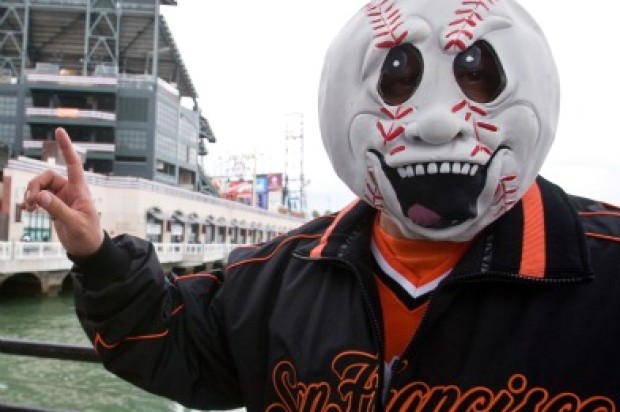
While visiting the San Francisco Giants on his farewell tour of Major League Baseball stadiums, outgoing Commissioner Bud Selig took more questions on cross-Bay rivals the Oakland A’s than the Giants.
The commissioner also took questions on the league’s handling of domestic violence cases and recent changes to league rules as he spoke to reporters inside AT&T Park this morning in his 18th ballpark visit of the year before he retires in January.
Outside, fans flocked to a 12:45 p.m. game against the Arizona Diamondbacks.
The Giants have consistently drawn larger crowds than the A’s since moving into AT&T Park in 2000 and the A’s have been clamoring for a new stadium for nearly a decade with no end in sight.
Selig declined to comment on the A’s situation today, as he mostly did when he visited Oakland last month, except to say that “There’s no question that the A’s need a new ballpark,” and to compare the O.co Coliseum to the New York Mets’ former home Shea Stadium, a venue he called a “dump.”
“It is a very complicated situation,” he said, but declined to comment further because Major League Baseball is being sued by the city of San Jose, which has sought to have the team move there since 2009 but has been blocked by the Giants’ territorial rights to the area.
“This has been a backburner issue because there’s nothing you can do until litigation is resolved,” he said.
Selig said that when he became commissioner in 1992, the Giants could only draw 1.5 million fans per year, but since AT&T Park was finished, attendance has doubled.
“There’s no team that could stay in Candlestick Park and succeed,” Selig said. “I knew they had to build a ballpark.”
His first visit to Candlestick was on July 2, 1963, when he traveled there with the visiting Milwaukee Braves, Selig said. The game was a 16-inning pitchers’ duel between Juan Marichal for the Giants and Warren Spahn for the Braves that had no score until Willie Mays hit a walk-off home run for a 1-0 Giants victory.
Selig came dressed for July in California and was startled by the cold weather at Candlestick.
Even then, he said he was struck by the poor logistical layout at the Giants’ former home.
“How could you build a ballpark in this day and age and have only one access road?” he said.
Selig also declined to comment directly on recent controversies surrounding the National Football League’s handling of the case involving former Baltimore Ravens running back Ray Rice knocking his then-fiancée unconscious in an elevator.
But when asked if the baseball needs a league-wide domestic violence policy, Selig said that he prefers to handle things on a case-by-case basis and he has been pleased with the way such situations have been handled in the past.
“We deal with them quite effectively,” he said.
A potential league-wide policy has been discussed but if implemented, it would be handled by his successor as part of the collective bargaining negotiations with the Major League Baseball Players Association.
Selig today also touted the most recent changes to baseball — instant replay for controversial calls and a two-team wild card playoff format.
When implementing instant replay, Selig said he worried at first that the games would drag on too long, but in fact he thinks it has speeded things up because managers have less opportunity to argue close calls.
Passionate managers like the New York Yankees’ Billy Martin or the Baltimore Orioles’ Earl Weaver might argue calls for 10-15 minutes, while the average replay takes one minute, 57 seconds, Selig said.
Selig quoted former A’s and St. Louis Cardinals manager Tony LaRussa, who he said recently called him regarding the replay implementation and said, “We had no right to expect it to be this good, this fast.”
More controversial has been the implementation in 2012 of a one-game wild card playoff for the two teams in the American and National League with the best record who did not win their division.
Selig said he originally preferred the idea of a best-of-three format but some managers he consulted, like former Yankees and Los Angeles Dodgers manager Joe Torre, talked him into the one-game format.
He said the new format has been successful.
“Everybody really likes it,” he said. “You can’t keep stretching games out and expect to get them all in.”
Selig did address one Giants-related controversy, the career home run record of San Francisco slugger Barry Bonds, who has not been voted into the baseball Hall of Fame despite his achievements because of his use of performance enhancing drugs.
The commissioner was asked whether he considered Bonds the home run king given his close friendship with the previous record holder, Henry Aaron.
“Barry Bonds set the record,” Selig said. “You get into a slippery slope when you try to change facts as they are.”
Scott Morris, Bay City News









